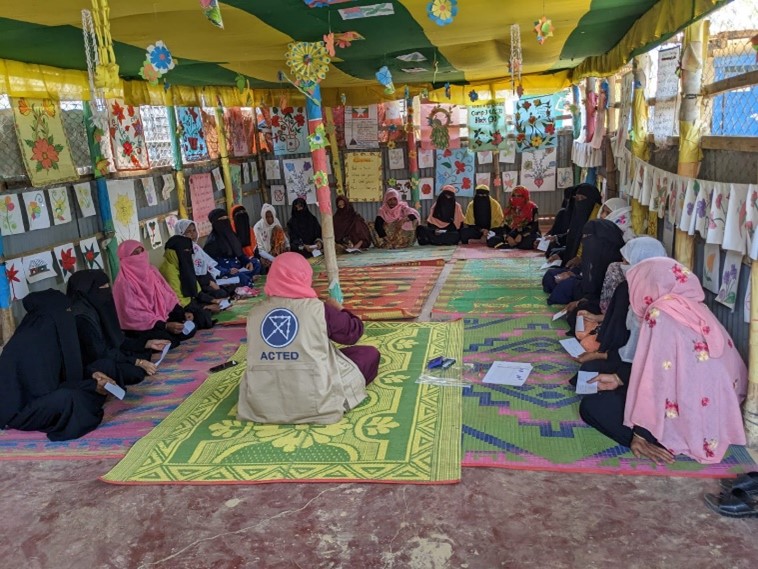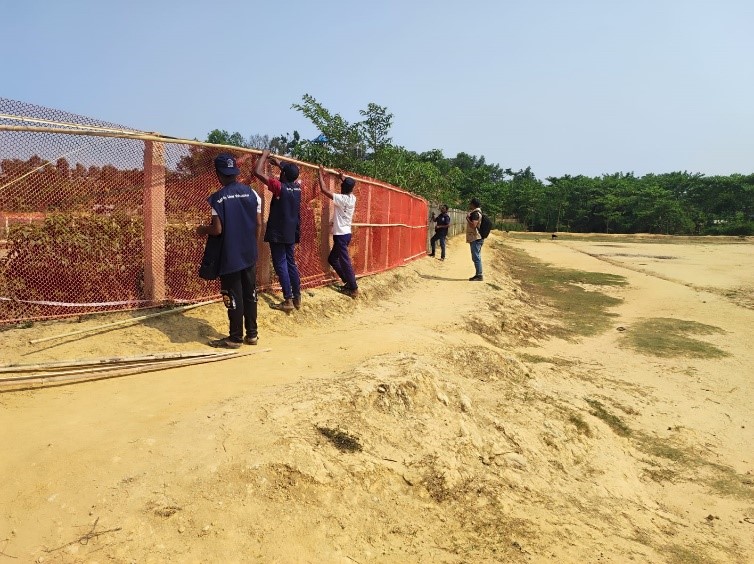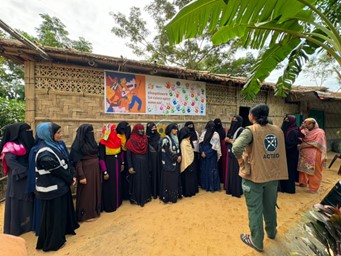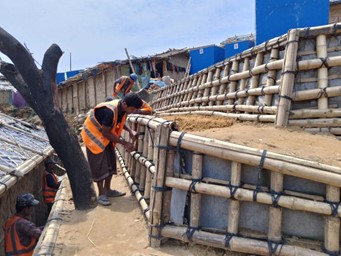Since early 2018, Acted has been actively responding to the Rohingya refugee crisis in Bangladesh, which was triggered by the conflict in Myanmar. Currently, Acted's operations are concentrated in on those designated camps of the southern coastal region of Cox’s Bazar, near the Myanmar border. Acted supports all 33 Rohingya refugee camps in the area, located within the Kutupalong-Balukhali Expansion Site and Teknaf camps across the Ukhia and Teknaf subdistricts. The team implements CCCM, WASH, Protection and Information activities across all camps. Guided by its 3ZERO strategy, Acted Bangladesh has developed in 2024 a broader implementation strategy in order to address the many needs of the country. This strategy’s five pillars focus on sustainable impact: delivering emergency aid, integrated WASH solutions, digital information management, CSO support in area-based development, and advancing climate resilience with a green economy approach.
The Rohingya refugee camps in Bangladesh are home to nearly one million people who fled violence in Myanmar in 2017. These camps, located on deforested hills, offer limited infrastructure to support the large population. In addition the region is highly vulnerable to natural disasters such as floods, erosion, landslides, and cyclones due to its geographic location. Camp conditions are extremely challenging, with makeshift shelters and critical shortages in shelter, WASH (water, sanitation, and hygiene), protection, education, nutrition, healthcare, and income-generating opportunities. The situation is further complicated by rising violence and deeply rooted discriminatory social norms.
Today Acted supports the camps through 3 main pivotal units: CCCM including Community based protection and Emergency preparedness, DRR/WASH, and Information management support. The organization has mobilized trained volunteers, equipped firefighting units, and installed machinery for producing MHM (menstrual hygiene management) materials in camp to improve the refugees safety and sustainability. Acted also runs community and information service centers, and camp-level offices to ensure smooth operations. Environmental sustainability is a priority, with Acted emphasizing the use of eco-friendly materials and reforestation efforts as key components of its work in Bangladesh.
Acted in Bangladesh
Acted has become a key factor in camp settlement of Cox’s Bazar-Bangladesh Rohingya response, bridging the gap between humanitarian aid and long-term development efforts, Since 2018. Through a comprehensive approach, Acted addresses key issues such as resource scarcity, environmental degradation, and protection risks. By focusing on natural resource management, sustainable land rehabilitation, emergency preparedness, and community-based protection, Acted seeks to foster resilience in communities impacted by displacement. Additionally, with its work in WASH, Acted contributes to health and sanitation, essential in crisis contexts.
Acted’s triple mandate—humanitarian, development, and environmental aid—guides its efforts in promoting dignity, self-reliance, and environmental stewardship, ensuring that vulnerable populations can thrive in sustainable environments.
In Bangladesh, Acted is working towards its 3ZERO vision—Zero Exclusion, Zero Carbon, and Zero Poverty—through integrated projects addressing environmental degradation, poverty reduction, and community resilience. Ongoing projects like the Sustainable Land Management and Environmental Rehabilitation (SuLMER) initiative and Drain Monitoring and Intervention (DMI) align with this approach by tackling soil erosion, enhancing flood resilience, and promoting sustainable resource use.
Acted’s reforestation efforts in the deforested Kutupalong-Balukhali zone, where bamboo, Arjun saplings, and vetiver are planted to increase water retention capacity of the soil and combat erosion, also reflect the 3ZERO objective. These activities, carried out through Cash for Work programs, reduce carbon impact, restore ecosystems, and provide livelihoods for vulnerable communities, embodying Acted’s integrated approach to addressing urgent humanitarian needs while ensuring long-term environmental and social sustainability. Acted working in flagship activity, Camp Coordination and Camp Management (CCCM), with a multi-sectoral approach to improve the quality of life and security of Rohingya refugees.



